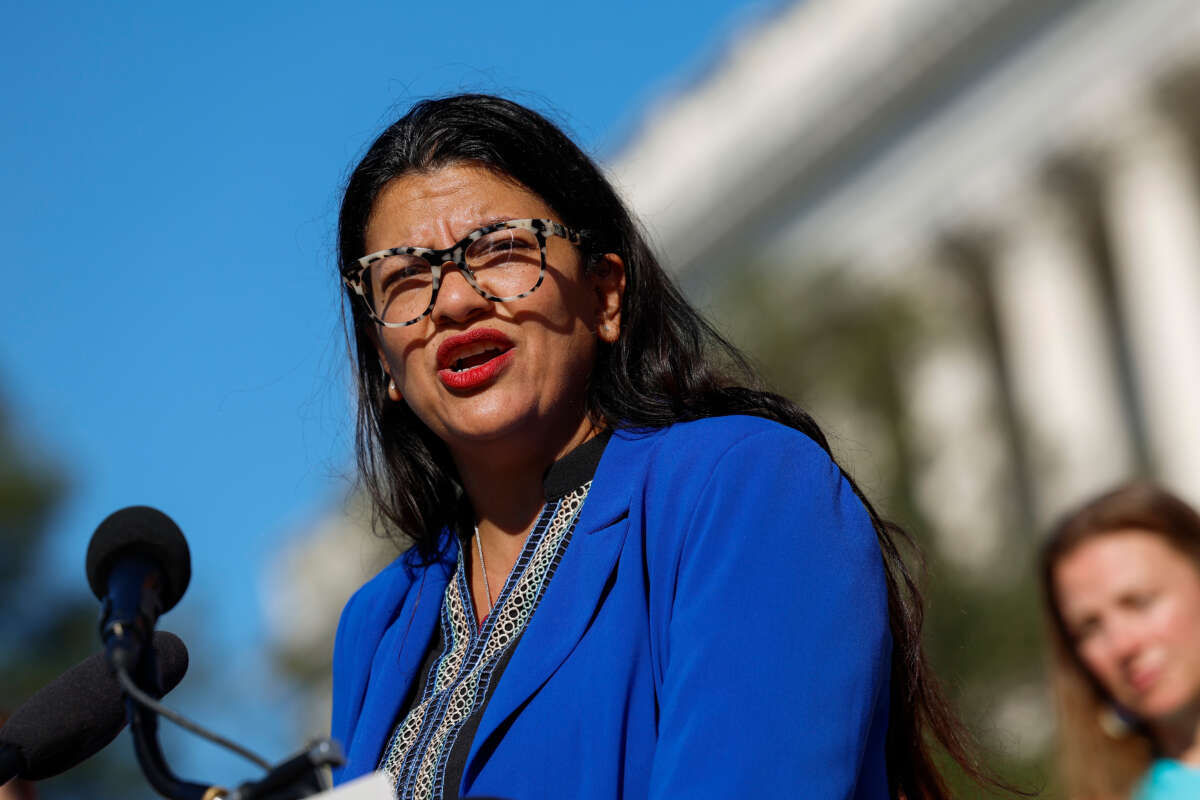Progressive Rep. Rashida Tlaib (D-Michigan) has announced that she is opposed to the bipartisan tax bill currently moving through Congress that would hand major tax cuts to corporations and the rich while giving marginal benefits to working families via a partial revival of the expanded child tax credit.
Leaders in Congress are working on a bill that would revive the pandemic-spurred child tax credit expansion, but lower the total from $3,600 per child to $2,000 per child per year and still impose an income limit that wouldn’t allow the poorest families to access the full benefit. And though the child tax credit portion of the bill has been much touted, the bill — dubbed the Tax Relief for American Families and Workers Act — would also hand out hugely disproportionate tax breaks to the wealthy.
In order to please Republicans and their deep-pocketed donors, bill authors inserted a number of tax-related favors for corporations, like expanding deductions that businesses can file for in the future and retroactively. These tax cuts come on top of the 2017 Republican Tax Cuts and Jobs Act, which already slashed the corporate tax rate and have allowed major corporations to owe $0 on their taxes some years despite raking in profits.
Tlaib condemned the cuts for corporations and the wealthy in a statement on Wednesday, pointing to calculations about how they would grant these groups favors at a time of already massive wealth inequality.
The press release points out that, just in the first year, the richest 0.1 percent of American households would get an average tax cut of $57,530 — nearly the entirety of what the median worker makes in a year — while the poorest 20 percent, or 88 million households, would get only $60.
Meanwhile, corporations that are “already dodging paying their fair share of taxes,” as Tlaib said, would see their effective tax rates cut even more; the effective tax rate for Meta, the owner of Facebook and Instagram, would drop from 25 percent to -2 percent if the bill were passed, she pointed out.
The bill has been estimated to cost $78 billion — but tax experts have warned that the bill will cost far, far more if the tax cuts are extended as they’re expected to be. If implemented over the next decade, the corporate tax breaks alone would add $600 billion to the deficit, some research has found. The bill is expected to face a vote on Wednesday in the House.
“Working families in my district should never be paying higher taxes than the richest companies on earth,” Tlaib said. “I cannot support a bill that deepens wealth inequality and economic injustice to benefit the richest Americans and corporations.”
Instead, Tlaib calls for lawmakers to pass the End Child Poverty Act, which she and Representatives Ilhan Omar (D-Minnesota) and Jesús “Chuy” García (D-Illinois) introduced last year. The bill would combine provisions in the current child tax credit and the Earned Income Tax Credit in order to create a “universal child benefit” that would provide families with a payment of $428 per child per month, or over $5,000 a year.
The progressive lawmakers’ bill would cut child poverty by 61 percent, the lawmakers have found. By contrast, estimates for the bipartisan proposal find that it would still leave 93 percent of children in the poorest 20 percent of households without the full tax credit, and would lift 400,000 children out of poverty — compared to the 3.8 million children lifted out of poverty by the expanded COVID-era tax credit.
“Our families deserve bold, transformative policies that take meaningful steps to end child poverty at its roots,” Tlaib said. “We need real solutions, not more tax breaks for the rich. We should stay at the table and demand a better deal for our children, not settle for crumbs.”
Other Democrats have also cited the tax bill’s disproportionate effects as reasons they’re opposing it.
“The tax deal fails on equity,” said Rep. Rosa DeLauro (D-Connecticut), who has long advocated for child tax credit expansion. “It delivers huge tax cuts for giant corporations while denying middle class families the economic security they had under the expanded, monthly Child Tax Credit. It also leaves the poorest families behind because of a policy choice. At a time when a majority of American voters believe tax on big corporations should be increased, there is no reason we should be providing corporations a tax cut while only giving families pennies.”
Media that fights fascism
Truthout is funded almost entirely by readers — that’s why we can speak truth to power and cut against the mainstream narrative. But independent journalists at Truthout face mounting political repression under Trump.
We rely on your support to survive McCarthyist censorship. Please make a tax-deductible one-time or monthly donation.
